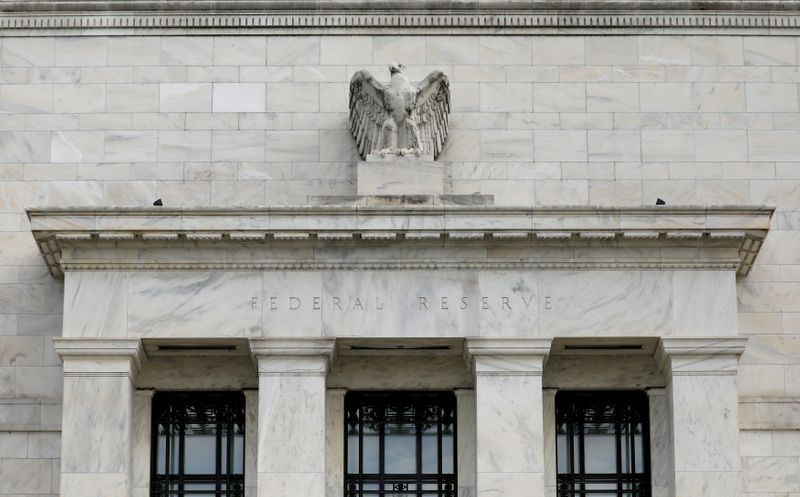By David Henry and Michelle Price
WASHINGTON (Reuters) - Big U.S. banks will have to resume holding an extra layer of loss-absorbing capital against U.S. Treasuries and central bank deposits from next month after the Federal Reserve said on Friday it would not extend a temporary pandemic regulatory break due to expire this month.
The Fed said it would, however, launch a formal review of the capital rule, known as the "supplementary leverage ratio," due to concerns it is no longer functioning as intended as a result of the central bank's emergency COVID-19 monetary policy measures.
While the Fed's decision to review the rule is a win for Wall Street banks, which have long argued the leverage ratio is fundamentally flawed, its refusal to extend the exemption, as many analysts had expected, came as a disappointment.
Shares of the largest U.S. banks fell after the news, with JPMorgan Chase & Co (NYSE:JPM) losing as much as 4% before closing down 1.6% on the day. Bank of America Corp (NYSE:BAC)'s and Citigroup Inc (NYSE:C) lost 1% and 1.1%, respectively.
"Wall Street bank stocks will get punished because now they will have to put more money aside," Edward Moya, senior market analyst at foreign exchange brokerage Oanda, said in an email.
He added, however, that the planned review of the leverage ratio "should alleviate concerns that this is a final decision."
To ease Treasury market stress and encourage banks to lend to Americans struggling amid lockdowns, the Fed last April excluded Treasuries and central bank deposits from the leverage ratio until March 31.
Uncertainty over whether it would stick to that expiration date has compounded anxiety in fixed income markets. Banks have warned that allowing the rule to expire could push them to pull back from buying government debt and from lending, potentially sparking another bout of market turmoil.
The issue has become a political hot potato, with powerful Democrats pressuring Fed Chair Jerome Powell to deny Wall Street what they say is an unwarranted break that could increase systemic risks. They point out that big banks have plenty of cash to buy back shares and issue dividends.
"This is a victory for lending in communities hit hard by the pandemic, and for the stability of our financial system," said Democratic Senator Sherrod Brown, who had previously warned the Fed that extending the exemption would be a "grave error."
Benchmark 10-year Treasury yields jumped around five basis points on the announcement to 1.750%, nearing Thursday's the one-year high of 1.754%.
But Fed officials said they were confident that allowing the exemption to expire would not impair Treasury market liquidity or cause disruption because the market had stabilized and big banks are flush with capital.
BALLOONING BALANCE SHEET
The leverage ratio was adopted after the 2007-2009 financial crisis as a safeguard to prevent big banks from manipulating other capital rules. It requires them to hold additional capital against assets regardless of their risk.
But the ratio is rapidly becoming the primary limit on banks' balance sheets which have swelled as a result of the Fed pumping cash into the economy amid the pandemic.
In the last year, the Fed has nearly doubled its balance sheet to more than $7.7 trillion through around $3.4 trillion in bond purchases. That extraordinary intervention, along with near-zero interest rates, aims to keep money flowing through the banking system.
As a result, bank deposits at the Fed, known as reserves, have sky-rocketed to $3.9 trillion since the pandemic began, according to Fed data from Thursday, and are expected to increase by another $2 trillion before the Fed pares back stimulus efforts.
“That pressure is pretty significant," said Gennadiy Goldberg, interest rate strategist at TD Securities, adding it may cause banks to step away from "market supporting roles."
Some banks might have to issue preferred shares to add enough capital in the near term to handle the increasing deposits, which would dilute common stock by 1% to 2%, Glenn Schorr of Evercore ISI wrote in a note.
Banks say reserves and U.S. Treasuries are effectively risk-free and it makes little sense to penalize them. (Graphic: Bank reserves held at the Fed have skyrocketed, https://fingfx.thomsonreuters.com/gfx/mkt/yzdpxeqlkvx/Pasted%20image%201616161155027.png)
The Fed indicated on Friday that it had heeded those complaints. Due to the continued growth in reserves and Treasury issuance, it said it may recalibrate the ratio "to prevent strains...that could both constrain economic growth and undermine financial stability."
However, it added that any changes to the rule would not erode the overall strength of bank capital requirements.
While the Fed's decision appears to be a neat compromise to appease both Wall Street and progressive Democrats, the rule review, which will be subject to public consultation, is likely to be a fraught and lengthy process, said analysts.
Progressives, who say Powell is inclined to be too friendly to Wall Street on regulatory issues, are generally skeptical of any attempt to crack open post-crisis rules and may fight changes. That could leave the market in an uncomfortable limbo, said analysts.

"Unless there is a fix relatively quickly, I think there’s going to be a lot of caution in the market and a lot of concerns about volatility," said Goldberg.